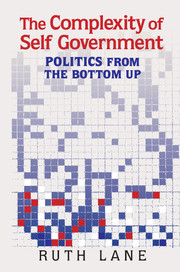Book contents
- The Complexity of Self Government
- The Complexity of Self Government
- Copyright page
- Contents
- Preface
- 1 The Simplicity of Complexity
- 2 The Haecceity of Politics
- 3 The Complexity of Self Organization
- 4 The Social Complexity of Games
- 5 The Complexity of Change
- 6 The Complexity of Political Intelligence
- 7 The Complexity of Simplicity
- Notes
- References
- Index
- References
References
Published online by Cambridge University Press: 26 January 2017
- The Complexity of Self Government
- The Complexity of Self Government
- Copyright page
- Contents
- Preface
- 1 The Simplicity of Complexity
- 2 The Haecceity of Politics
- 3 The Complexity of Self Organization
- 4 The Social Complexity of Games
- 5 The Complexity of Change
- 6 The Complexity of Political Intelligence
- 7 The Complexity of Simplicity
- Notes
- References
- Index
- References
- Type
- Chapter
- Information
- The Complexity of Self GovernmentPolitics from the Bottom Up, pp. 193 - 198Publisher: Cambridge University PressPrint publication year: 2016



